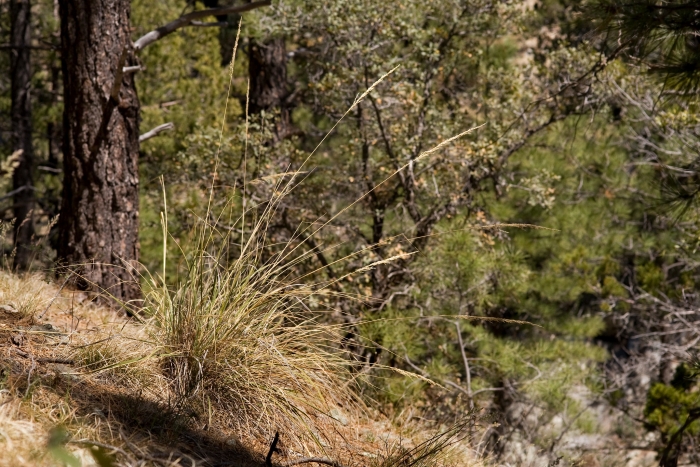Longtongue Muhly
(Muhlenbergia longiligula)
Longtongue Muhly (Muhlenbergia longiligula)
/
/

Patrick Alexander
CC0
Image By:
Patrick Alexander
Recorded By:
Copyright:
CC0
Copyright Notice:
Photo by: Patrick Alexander | License Type: CC0 | License URL: https://creativecommons.org/licenses/by/2.0 | Uploader: Josve05a | Publisher: Wikimedia Commons |
























Estimated Native Range
Summary
Muhlenbergia longiligula, commonly known as Longtongue Muhly, is a deciduous perennial grass native to open woodlands, grasslands, and pine-oak forests in the Southwestern United States and Mexico. It typically grows to a height of 2-4 feet (0.6-1.2 meters) and a width of 2-3 feet (0.6-0.9 meters). This grass is characterized by its fine-textured, blue-green foliage and delicate, airy flower panicles that appear in late summer to fall. The flowers are not particularly showy but add a subtle beauty to the landscape, especially when backlit by the sun.
Longtongue Muhly is valued for its drought tolerance and ability to thrive in poor soils, making it an excellent choice for xeriscaping and naturalistic plantings. It is also used for erosion control and as an accent plant in borders and meadow gardens. In cultivation, it prefers full sun to part shade and requires well-drained soils. While it is low-maintenance, it benefits from occasional watering during prolonged dry spells. Longtongue Muhly is not known to have significant disease or pest issues, but it can self-seed and spread if conditions are favorable, which should be monitored to prevent unwanted naturalization.CC BY-SA 4.0
Longtongue Muhly is valued for its drought tolerance and ability to thrive in poor soils, making it an excellent choice for xeriscaping and naturalistic plantings. It is also used for erosion control and as an accent plant in borders and meadow gardens. In cultivation, it prefers full sun to part shade and requires well-drained soils. While it is low-maintenance, it benefits from occasional watering during prolonged dry spells. Longtongue Muhly is not known to have significant disease or pest issues, but it can self-seed and spread if conditions are favorable, which should be monitored to prevent unwanted naturalization.CC BY-SA 4.0
Plant Description
- Plant Type: Grass
- Height: 2-4 feet
- Width: 1.5-2.5 feet
- Growth Rate: Moderate
- Flower Color: N/A
- Flowering Season: Fall
- Leaf Retention: Deciduous
Growth Requirements
- Sun: Full Sun, Part Shade
- Water: Low
- Drainage: Fast
Common Uses
Bird Garden, Deer Resistant, Low Maintenance
Natural Habitat
Native to open woodlands, grasslands, and pine-oak forests in the Southwestern United States and Mexico
Other Names
Common Names:
Scientific Names: , Muhlenbergia longiligula, Epicampes ligulata, Epicampes anomala, Melica anomala, Epicampes distichophylla var. mutica, Epicampes stricta var. mutica,
GBIF Accepted Name: Muhlenbergia longiligula Hitchc.